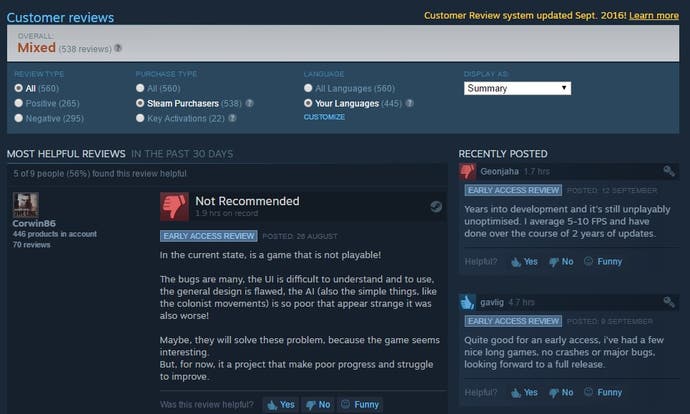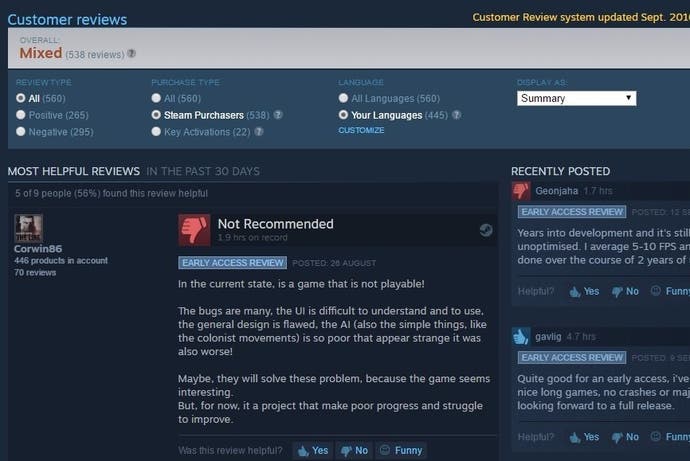Valve finally takes on Steam user review score manipulation
But has it been heavy-handed?
Valve just changed the way Steam user reviews work - and it's certainly set the cat among the pigeons.
In May, Valve updated Steam so that it highlighted recent reviews on games. The thinking behind this change was sound: it wanted to better show the current state of a game, many of which evolve quickly as developers issue updates.
Now, though, Valve is changing the default review score that shows up at the top of each product page - the one developers and potential customers put so much stock in - so that it does not include reviews written by those who obtained the product through a Steam key.
What this means is that reviews penned by those who got a game after backing it on Kickstarter, for example, or via a developer's website, do not affect the Steam user review score.
Again, the thinking behind this change is sound. Valve knows that some developers were gaming the system - that is, they were giving keys to friends or shadey paid services in exchange for positive reviews.
Here's Valve in a Steam blog post:

"... the review score has also become a point of fixation for many developers, to the point where some developers are willing to employ deceptive tactics to generate a more positive review score.
"The majority of review score manipulation we're seeing by developers is through the process of giving out Steam keys to their game, which are then used to generate positive reviews. Some developers organise their own system using Steam keys on alternate accounts. Some organisations even offer paid services to write positive reviews."
The upshot is that while Steam keys will remain free for developers to give out or sell through other online or retail stores, Valve has deemed it too easy for these keys to end up being used in ways that artificially inflate review scores.
It reckons at least 160 games have a "substantially greater percentage of positive reviews" by users who activated the product with a cd key, compared to customers who bought the game directly on Steam.
"In many cases, the abuse is clear and obvious," Valve said. It's now banned false reviews and threatened to end business relationships with developers that continue violating its rules.
Valve said customers who received a game from a source outside of Steam can still write a review of the game on Steam, and it will be visible on the store page, but it will no longer contribute to the score.
And that's the sticking point for a number of developers who have reacted to the change with concern.
Maia developer Simon Roth, who successfully crowdfunded his colony building game on Kickstarter, took to Twitter to say the Steam user review change could put him out of business.
Roth's point is that some developers rely on reviews from those who received their game from a source outside of Steam - and that Valve's decision unfairly impacts those who have not resorted to gaming the system in a bid to improve their score.
Maia's Steam user review score is "mixed" (45 per cent of the 538 user reviews are positive) - and Roth is concerned it can now never be improved because future potential positive reviews would likely come from his most passionate fans - those who backed Maia on Kickstarter or bought the game direct.
Roth isn't the only developer to express concern. Death Ray Manta developer Rob Fearon said he lost 40 Steam user reviews out of 120 following the system change.
But not all legitimate developers have been impacted negatively by the change. War for the Overworld developer Brightrock Games saw a slight net positive change to its Steam user review score even after losing Steam reviews.
For its part, Valve said that following the update, the review score category shown for about 14 per cent of games will change, some up and some down. Valve added that a change of one per cent in edge cases (69 per cent positive or 70 per cent positive) can mean the difference between a review score category of "mixed" and "positive".
"We know that Steam customer reviews can only be valuable in aiding you as long as you can trust the data we're presenting," Valve concluded. "The changes made today target the main abuse we're seeing, and give you more control over the information you see when evaluating a game."
Clearly, the developers of many games in that 14 per cent will have gamed Steam's system. But for those who haven't, for those such as Simon Roth, Valve has made life a lot more difficult.







